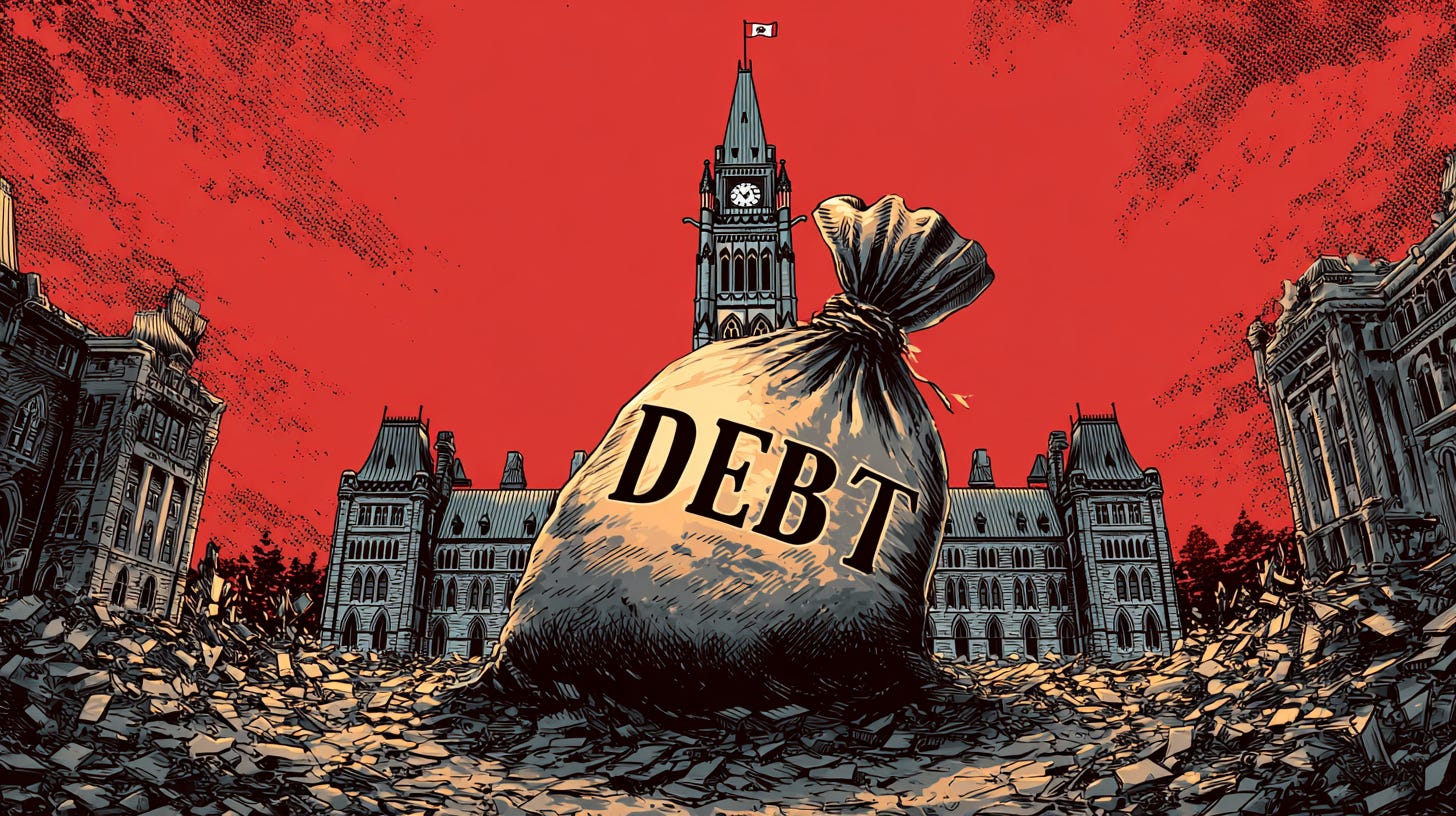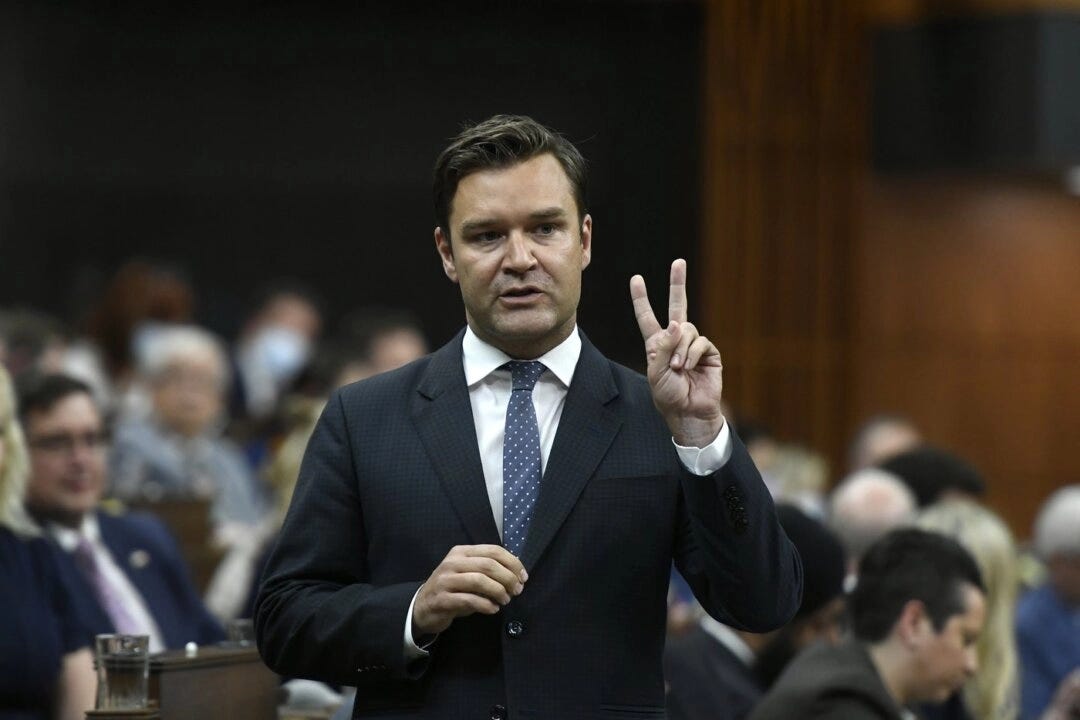Good morning, it’s Friday, November 7th. In today’s news, Mark Carney’s government quietly advances the Digital ID agenda, Activist judges are eroding Canada’s democracy, Canada looks to raise the debt ceiling to a record $2.54 trillion, Conservative MP Matt Jeneroux resigns from parliament, and much more.
First time reading the daily blend? Sign up here.
Mark Carney’s Government Quietly Advances the Digital ID Agenda
The language of control always begins with the language of convenience. Ottawa’s new plan to centralize digital identification—touted as “modern,” “efficient,” and “integrated”—is being rolled out under the banner of service improvement. But beneath the bureaucratic phrasing lies something more consequential: the slow construction of an infrastructure that could one day determine the boundaries of personal freedom.
According to the government’s own budget notes, the Digital Benefits Delivery Modernization Programme will unify identification for Employment Insurance, Old Age Security, and other benefits. On paper, it’s a harmless update. In practice, it’s a system capable of merging identity, financial access, and biometric data under a single digital key controlled by the state. When paired with the World Economic Forum’s “Known Traveller Digital Identity” pilot already active at Canadian airports, it signals a broader movement—one where daily life, travel, and even medical access may soon hinge on one’s digital compliance.
The official assurances are familiar: participation will be “voluntary,” privacy “protected,” and oversight “rigorous.” But history offers little comfort. In the name of efficiency, every “optional” innovation—from digital passports to online health records—eventually becomes the norm, with paper or offline alternatives quietly withdrawn. Convenience is not just a selling point; it’s the lever by which freedom is traded for access.
Auditor General reports and privacy commissioner warnings only deepen the concern. Ottawa has already been caught secretly tracking cellphone data during the pandemic. Now, new contracts aim to expand federal monitoring of electronic medical records, granting health officials “real-time, nationwide access” to personal data. Even if this begins under ethical oversight, the precedent is clear: once the state builds a tool for surveillance, it rarely disassembles it.
Meanwhile, U.S. lawmakers are warning of a global drift toward “digital authoritarianism” exported by China’s Communist Party—where AI-driven data collection underpins social credit systems that punish dissent and reward obedience. The uncomfortable truth is that Canada’s own policies, though wrapped in democratic language, increasingly resemble the same architecture of control.
Freedom rarely vanishes overnight. It dissolves through quiet compromises: a new app here, a digital ID there, all in the name of progress. The question is not whether Canada’s digital identity system will be abused—but how long it will take before it is. Source.
Are Activist Judges Eroding Canada’s Democracy?
Canada’s justice system—once widely respected for impartiality—is increasingly seen as a politically charged institution, particularly at the Supreme Court and appellate levels. While Canadians continue to value courts as guardians of fairness, recent decisions reveal a troubling trend: judges are moving beyond interpreting law to shaping public policy, often in ways that clash with legislative intent.
A key driver of this shift is the judiciary’s expansive use of the Charter of Rights and Freedoms. Cases like R. v. Oakes (1986) illustrate the courts’ embrace of the “Oakes test,” which invites judges to weigh individual rights against public policy objectives. While designed to balance interests, this framework has sometimes allowed courts to invalidate legislation based on broad hypothetical scenarios rather than the concrete facts before them.
Recent rulings demonstrate the practical consequences of this approach. In R. v. Nur, (2015) the Supreme Court struck down mandatory minimum sentences by considering “reasonably foreseeable” cases of hypothetical offenders, potentially overturning hundreds of sentencing provisions. Similarly, Attorney General of Québec v. Senneville (2025) invalidated one‑year mandatory sentences for child sexual exploitation offences after weighing unlikely future scenarios, highlighting the courts’ growing role as quasi‑policy-makers rather than interpreters of law.
Immigration and citizenship cases further illustrate judicial overreach into politically sensitive terrain. In Pepa v. Canada (Minister of Citizenship and Immigration) (2025), the Court refined rules around visa timing and appeal eligibility, directly affecting who may remain in Canada. These decisions are emblematic of a judiciary increasingly comfortable intervening in areas traditionally reserved for Parliament or the executive branch.
At the same time, broader social considerations such as race, systemic inequities, and DEI principles are beginning to influence Canadian justice. Indigenous and Black Canadians remain significantly overrepresented in federal corrections, prompting parole boards to integrate systemic factors and culturally appropriate programs into their decisions. While well-intentioned, critics argue that such initiatives blur the line between adjudicating individual cases and enforcing social policy—a line courts have historically maintained.
Even as courts stretch their interpretive reach, ordinary Canadians continue to face inconsistencies in sentencing, prolonged delays, and a justice system that can appear more lenient toward offenders. This contrast—a judiciary active in social engineering while ordinary adjudication suffers—erodes public confidence and challenges the notion of legal certainty.
Correcting Course
The Landmark Cases Council, launched by the Macdonald-Laurier Institute, aims to restore clarity by critically analyzing Supreme Court decisions. The council seeks to show how courts have strayed from their proper role and how decisions might be guided instead by text, precedent, and legislative intent. Its goal is not to undermine judicial authority, but to reaffirm that judges should interpret law, not create it, preserving both democratic governance and the rule of law.
Canada’s justice system, once a pillar of stability, now risks becoming a vehicle for policy-making from the bench. Canadians deserve both respect for the judiciary and confidence in democracy, but that balance depends on judges respecting the limits of their constitutional authority and allowing elected legislatures to make policy decisions.
Canada Looks to Raise Debt Ceiling to Record $2.54 Trillion
For the third time in four years, the federal government is raising the national debt ceiling, granting itself permission to borrow up to $2.54 trillion, an increase of nearly 20 percent over the current limit. According to Blacklock’s Reporter, the Department of Finance confirmed the move in a budget notice, citing the need for “flexibility” in delivering programs and maintaining services. But make no mistake — this is another sign that spending has far outpaced revenue, and that Canada is living well beyond its means.
To understand what this means, think of the debt ceiling as the government’s credit limit. It’s the legal cap on how much Ottawa can borrow. When the ceiling gets raised, it’s not necessarily new spending being approved — it’s permission to keep borrowing to cover existing commitments. The problem is that raising the limit repeatedly suggests the government is trapped in a cycle of deficits and debt, spending far more than it collects through taxes and other revenue.
The sheer size of this new ceiling — more than two and a half trillion dollars — underscores just how large that gap has become. It’s the highest borrowing capacity in Canadian history. For a country with just under forty million people, that’s a staggering figure, and it means the cost of interest payments alone will continue to soar.
In fact, debt-servicing costs now exceed federal health transfers, meaning Ottawa spends more paying interest to bondholders than helping provinces fund hospitals, doctors, and nurses. That’s not a sustainable balance — it’s a red flag.
Supporters of the move argue that borrowing allows the government to maintain stability and fund programs Canadians depend on. But each new hike to the debt ceiling kicks the problem further down the road, shifting the burden to future taxpayers who will eventually face higher taxes, reduced services, or both.
This is why critics have called the current administration the most expensive government in Canadian history. It’s not just about how much is being spent — it’s about how much is being borrowed to sustain it.
Canada’s debt ceiling might sound abstract, but it’s a clear measure of national priorities. And right now, those priorities are being financed on credit. Source.
Conservative MP Matt Jeneroux Resigns From Parliament
Conservative MP Matt Jeneroux, who has represented Edmonton Riverbend since 2015, announced that he will resign from Parliament in the spring of 2026, to focus on his family. He emphasized that his decision was voluntary and amicable, with no coercion, and praised his colleagues, including party leader Pierre Poilievre, for their support.
Jeneroux’s departure follows Nova Scotia MP Chris d’Entremont’s recent move to the Liberals, though Jeneroux denied any plans to switch parties. Poilievre thanked Jeneroux for a decade of public service, while Jeneroux expressed hope to address the House one final time before leaving.
His resignation will vacate his seat in Edmonton Riverbend, prompting a future by-election. More
Over 5,000 Researchers Resist Grant Transparency—Are Tax Dollars Funding DEI Priorities?
More than 5,000 researchers are resisting a parliamentary committee’s request for 25 years of detailed grant application data from Canada’s main health and science funding bodies. MPs say the aim is to assess whether equity, diversity, and inclusion (DEI) criteria are unintentionally skewing funding and affecting research excellence.
The information requested includes demographics, DEI questionnaire responses, reviewer comments, and funding decisions. While some critics warn of privacy risks, supporters argue that transparency is entirely reasonable given that grant money comes from taxpayers. Public access to detailed data ensures accountability, reveals long-term trends, and helps determine whether funding is truly merit-based rather than driven by ideological priorities.
Many researchers’ resistance to sharing this data has raised eyebrows, as it may suggest a desire to shield certain patterns or priorities from scrutiny. Proponents emphasize that this effort is about fairness, consistency, and integrity—allowing Canadians to see how public research dollars are allocated and ensuring that excellence, not internal biases, drives funding decisions. More
Immigrants Get Mere House Arrest for Running Fraudulent Truck Driving Schools in Ontario - More
France Urges EU to Investigate Shein Over Childlike Sex Dolls Found on Website - Shein’s alleged breach, coinciding with the opening of its Paris store, has drawn protests and political backlash. More
Former Speaker and Legendary Stock Trader Nancy Pelosi Announces Retirement From Congress After 32 Years - More
Somali Pirates Hijack First Vessel in 18 Months by Launching a Grenade Attack - The attack raises fears of a return to hijacking on a trade route that had stabilized in recent years. More
Sudanese Paramilitary Group Agrees to Humanitarian Truce Proposed by US-led Mediators - More
Portugal Intercepts a Narco-Submarine Carrying 1.7 Tons of Cocaine En Route to the Iberian Peninsula - More
Tesla Shareholders Approve Record $1 Trillion Pay Package for Elon Musk
Roughly 75% of Tesla shareholders voted to approve a compensation plan worth up to $1 trillion, potentially making Elon Musk the world’s first trillionaire, according to CNBC and Business Insider.
Under the plan, Musk must meet several ambitious targets by 2035:
Raise Tesla’s market cap to $8.5 trillion (from roughly $600 billion today).
Sell 12 million vehicles per year.
Deploy 1 million robotaxis and 1 million humanoid robots.
Musk must also remain Tesla’s CEO for 7.5 years to qualify, though he can continue leading SpaceX and xAI.
He currently holds a net worth of about $461–$473 billion, topping the Bloomberg Billionaires Index. The new package follows months of debate, with Norway’s $1.6 trillion sovereign wealth fund warning of share dilution and “key person risk.”
Musk celebrated the vote at Tesla’s Austin meeting, calling it “a whole new book” for the company’s future. More
Ditch the Chemicals, Embrace the Tallow—Skin Care Done Right
Most products aren’t designed to heal your skin—they’re designed to keep you buying more. More dryness? Use this serum. More irritation? Try this cream. And that “hydrating cream?” It might as well come with a hazard warning. It’s a never-ending cycle.
Your skin needs real nourishment, not lab experiments. That’s why I use F-Balm and the Freedom Face Whip from The Tallowed Truth—made from grass-fed, grass-finished tallow. It’s also hormone-free, antibiotic-free, steroid-free, GMO-free, and even vaccine-free—Nothing artificial. Nothing toxic. Just results.
I’ve been using their products for over a year now…and I’m never going back. What makes the Tallowed Truth even better is that they’re a freedom-first brand that supports Blendr News and everything we stand for.
If you’re already use their products or want to give them a try, go to www.thetallowedtruth.com/blendr and use code BLENDR for 15% off—even on bundles that are already discounted , so you can get as much as 40% off your purchase!
They even offer a 30-day money-back guarantee, so you’ve got nothing to lose.
Michael Burry of ‘The Big Short’ Bets $1.1 Billion Against Nvidia and Palantir in AI Short - More
Crypto Firm Ripple Raises $500 Million in Latest Investment Round at $40 Billion Valuation - More
Why Is Society So Divided? Scientists Identify a Rather Paradoxical Reason
A new study published in PNAS finds that global political polarization surged between 2008 and 2010, coinciding with a sharp rise in people’s close social circles—from about two friends to four or five.
Researchers from the Complexity Science Hub (CSH) analyzed over 27,000 Pew surveys and 57,000 friendship-network surveys from the US and Europe. They found that as social connectivity increased, societies became more polarized and fragmented, forming tighter ideological “bubbles” with fewer bridges between groups.
The team’s mathematical model showed that once social networks exceed a critical density (around 3–4 close friends), polarization spikes—similar to a phase transition in physics.
The timing aligns with the rise of smartphones and social media, suggesting digital connectivity may have fuelled both greater social interaction and deeper division, weakening tolerance and threatening democratic dialogue. More
New Protein-Based Gel Regrows Tooth Enamel and Could Transform Dentistry as We Know It - More
Nanotech Makes Cancer Drug 20,000x Stronger, Without Side Effects - More
Ex-NFL star Antonio Brown arrested on attempted murder charge
Former NFL star Antonio Brown, 37, has been arrested on an attempted murder charge related to a May 16 shooting following a celebrity boxing event in Miami, police confirmed Thursday.
Brown was taken into custody by US Marshals in Dubai and later flown to New Jersey, where he is being held pending extradition to Florida. According to the arrest warrant, Brown allegedly took a handgun from a security guard and fired two shots at Zul-Qarnain Kwame Nantambu, a man he had fought with earlier. One bullet reportedly grazed Nantambu’s neck. If convicted, Brown faces up to 15 years in prison and a $10,000 fine.
Brown, a former All-Pro wide receiver with over 12,000 career yards and 83 touchdowns, last played in 2021. His post-NFL career has been marked by multiple legal troubles, including assault, domestic disputes, and the viral 2021 incident in which he left the field mid-game for Tampa Bay. More
Dallas Cowboys’ Marshawn Kneeland Found Dead at Just 24 Years of Age - Kneeland was found with a self-inflicted gunshot wound following a police chase, officials said Thursday. More
FIFA Creates New Peace Prize to Be Awarded at World Cup—Trump a Favourite to Win - More
Capitals’ Alex Ovechkin Becomes First NHL Player to Score 900 Career Goals - More
A Bizarre Deep-Sea Creature Named ‘Death Ball Sponge’ Has Been Discovered in a Remote Corner of the Planet—It Looks Exactly the Way You Would Expect
A Hungarian Gamer Broke a Guinness World Record by Playing Dance Dance Revolution for 144 Hours
On This Day in History: October seems to love revolutions. In 1917, Lenin and the Bolsheviks stormed the Winter Palace, toppling Russia’s Provisional Government and setting the stage for the Soviet era. Fourteen years later, on the same day in 1931, Mao Zedong and Zhu De proclaimed the Chinese Soviet Republic, a communist-controlled territory spanning 18 provinces and 4 counties. Two revolutions, two continents, same date—history has a strange sense of timing.




















Might interest you re: Supreme Court -
https://www.amazon.ca/Most-Dangerous-Branch-Undermined-Democracy/dp/0773526145/ref=mp_s_a_1_1?sr=8-1